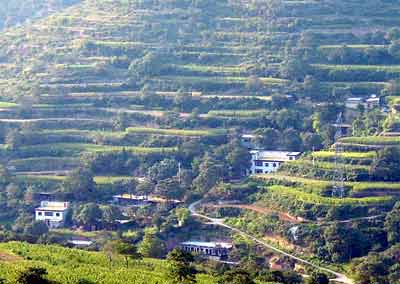|
Land-forest conversion continues in the west
By Zhao Huanxin (China Daily)
Updated: 2004-10-14 22:48
China will not retreat from its massive drive of "returning reclaimed farmland to forest" in the west, but will proceed with caution to ensure sustainable development and a better life for farmers.

The picture showscultivated landin the mountainous region in Zhengzhou, central China's Henan Province, September 21, 2004. [newsphoto/file] |
It is unjustified to claim the five-year reforesting efforts were to blame for the country's declining grain harvest, Li Zibin, vice-minister of the National Development and Reform Commission, said Thursday in Beijing.
To protect the fragile ecological system in its vast west, China will have reconverted 7.86 million hectares of farmland to woods, and planted trees on 11.33-million-hectares of bare hills and land between 1999 and the end of 2004, Li told a press conference.
The conversion of cultivated land into woodland has incurred an annual grain loss of 6.5 million tons, Li quoted a survey of the National Bureau of Statistics as saying.
But thanks to efforts protecting and improving production capacity of the remaining farmland, a per-unit yield rise has enabled the affected areas to increase grain output by 5 million tons a year, meaning the annual reduction is actually 1.5 million tons, Li said.
China's grain production plummeted from 512.3 million tons in 1998 to 430.7 million tons last year, according to the Information Centre of the Ministry of Agriculture.
The drastic production fall was caused by the loss of arable land, which was encroached upon by urbanization and industrial expansion, and by the trend of reserving more farmland to cash crops rather than grain in recent years, Li said.
For example, coastal provinces like Jiangsu and Guangdong, which were not obliged to return land to forest, saw grain outputs drop by nearly 30 million tons in 2003 from the 1998 level, largely because of dwindling arable land devoted to grain production, he said.
Furthermore, what has been reforested in the west are not the basic farmlands with good farming conditions, but instead low-yielding fields on steep slopes or those vulnerable to water and soil erosion.
Therefore, the country's policy of returning reclaimed farmland to forest will remain unchanged in the years ahead, as it is key to protecting the local ecology and environment and ensuring sustainable development, he said.
But it is equally important to "strengthen the achievements" attained thus far, by providing sustenance to farmers, so they will neither rely on the returned farmland for a living nor cut trees in the reforested areas for firewood.
In addition to helping farmers improve production on the remaining farmland, local governments in the west have moved nearly 800,000 farmers from ecologically harsh areas to places where life is more feasible, Li said.
Xu Jintao, a researcher with the Agricultural Policy Institute of the Chinese Academy of Sciences, agreed the country should slow down its pace of converting more cultivated land into forest in the west.
Rather, the localities should contrive to improve the survival rate of the trees planted in the returned farmland, and ensure farmers, who have been subsidized after giving up land for reforestation, can still make a living after subsidies cease.
Foreign Investment
Also at Thursday's news conference, Vice-Minister Li said he is optimistic that foreign direct investment will grow rapidly in China's western regions, which boast of abundant resources, huge market potential and improving infrastructure and investment software.
The advantages will give investors good returns, said Li, who is also deputy director of the Office of the Leading Group for Western Region Development of the State Council.
West China uses only 4 per cent of the total foreign investment flowing into China, but the ratio is on the rise, according to Li.
The official also said the government's macro-economic control measures, being implemented throughout China, will contribute to the healthy development of the western regions, rather than retarding their growth.
The measures seek to eradicate high energy consuming and heavily polluting small cement, steel and other plants, while reinforcing sectors such as agriculture, transport, water works, education and public health undertakings, he said.
To provide a legal framework for China's massive western development strategy, the country's top legislature, the National People's Congress, is drafting a law to regulate measures and activities in promoting the western region, both in economy and social development, according to the official.
He also announced the 2004 China Western Forum, approved by the State Council, will he held in Nanning, capital of the Guangxi Zhuang Autonomous Region on November 18-19.
|